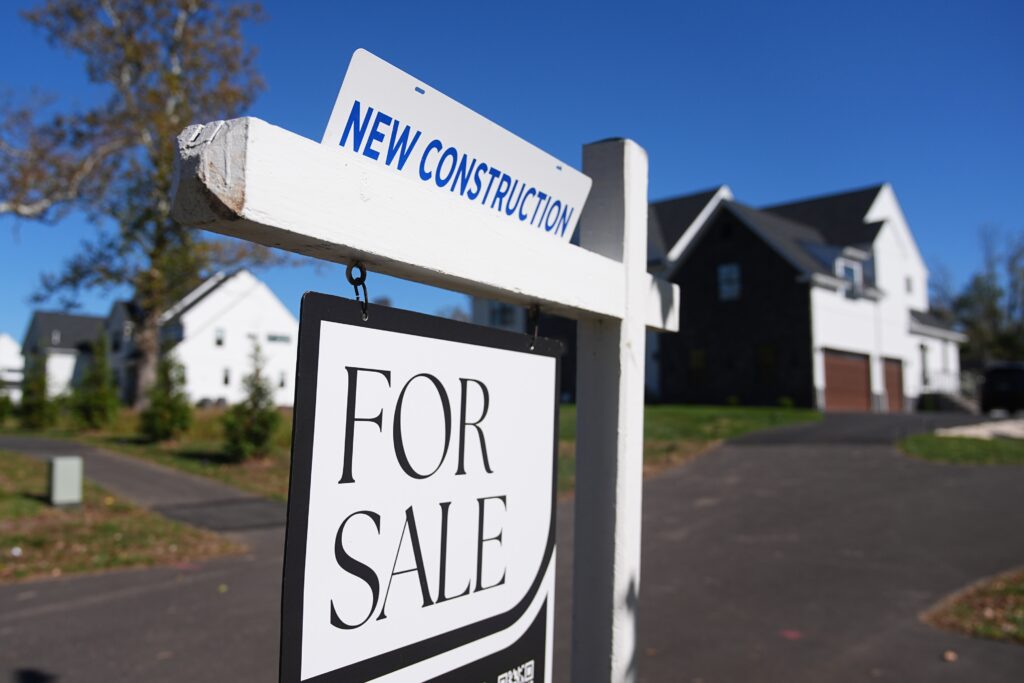Carson McDonald thought he would be a homeowner by now.
But the 35-year-old engineer and his wife, a dietitian, are just beginning to search for their first home. They’re prepared to look well beyond the D.C. neighborhood where they rent — possibly as far out as Annapolis, Maryland, some 30 miles to the east — to stay within their $700,000 budget. That price is just above the metro area’s median home price.
Born at the peak of the millennial generation, McDonald shares the experience of many of his peers, who have had a longer path to homeownership than previous generations. Between the sustained high interest rates of recent years and the sharply higher prices, homes have “seemed really expensive for a long time,” he said.
Members of the cohort born from 1981 to 1996 are now 29 to 44 years old — meaning they’ve all reached the age where their parents and grandparents were probably homeowners. But because the typical millennial has met with economic upheaval for much of their working life, they’ve been on a slower timeline.
The National Association of Realtors (NAR) made headlines this month when its annual survey of home buyers revealed an eye-popping statistic: The average first-time home buyer is now 40 years old.
For years, the real estate agents’ annual survey of home buyers showed a very gradual uptick in first-time buyers’ ages, from a median of 28 in 1991 to 33 in 2019. But it’s accelerated since the pandemic, the survey showed, jumping to 36 in 2022, 38 in 2024 and now 40.
But those findings don’t match up with other data on first-time home buyers.
Connor O’Brien, an economic policy researcher, analyzed data from the Census Bureau’s American Housing Survey, which asks a huge representative sample of Americans about their housing. By his findings, the median age of a first-time home buyer has held at 33 for nearly a decade, from 2014 to 2023, the most recent year data is available.
When more data comes out, O’Brien still isn’t expecting a huge uptick in buyers’ ages. Housing costs are higher now than before the pandemic, but not much higher than 2023. “The volume of sales hasn’t changed that much. Interest rates on new mortgages haven’t changed that much. Given that all these big market indicators have basically remained [flat], it would be strange to think the median age of buyers suddenly shot up,” he said.
Jerome Famularo, who researches the housing market at the Cato Institute, analyzed mortgage data compiled by the American Enterprise Institute. He found that the age breakdown for first-time home buyers has barely budged since 2018. The biggest bracket, ages 25 to 34, hovers between 42 and 45 percent of all first-time buyers each year. The share of buyers younger than 25 ticked up slightly, to 10.2 percent, last year.
The figures represent people who take out mortgages. Meanwhile, the share of all-cash buyers, who tend to be older and wealthier, has been rising.
So what’s going on? Are millennials delaying homeownership or are first-time home buyers just as young as they ever were?
The answer is yes on both counts: For buyers, the median age at which they purchase their first home is about the same, based on the American Housing Survey data that looks at a huge swath of households. But millennials are a big generation. There are more Americans born in 1990 and 1991 than any other years — people who are now 34 and 35 years old. And because fewer homes are being sold, fewer of those millennials are becoming home buyers at all.
It’s probably not true that the average first-time home buyer is that much older than before, despite the NAR’s questionnaire results. But it is true that millennials have found homeownership harder to attain than earlier generations.
“The number of first-time home buyers was just not that high. So it’s worth taking all these statistics with a grain of salt. You can’t just say [the median age] didn’t go up,” Famularo said. “Any one of these statistics, they’re all in the context of many other statistics.”
Jessica Lautz, an NAR economist, stood by her organization’s survey. She said her group sends an annual survey to people who bought houses in the past year. This year, the group mailed the questionnaire to more than 173,000 buyers, and 6,103 responded.
She speculated that perhaps young adults, who can’t afford homes in the cities they want to live in, are instead buying rental properties in cheaper markets as investments — which would show up as young purchasers in some other studies of first-time home buyers, but not in her survey, which only looks at buyers of primary residences.
Federal Reserve economists largely attributed the declining number of first-time home buyers to shrinking transactions overall. In 2003, more than 7 million people bought homes with mortgages. In 2023, it was just over 3 million, a reflection of fewer houses being built. Meanwhile, many homeowners were able to secure mortgage rates below 3 percent by buying or refinancing in 2020 and 2021; today, with rates in the 6 percent range, they are reluctant to sell, and home sales in recent months have been lower than any time since the Great Recession.
Meanwhile, the median home price has jumped nearly $100,000 in the past five years, Federal Reserve data show, to $410,800. The numbers are even higher in the West ($531,100) and Northeast ($796,700). Famularo theorized that one way millennials who are motivated to become homeowners have kept up is by buying in neighborhoods they might otherwise not have considered; his data shows first-time buyers choosing lower-income Zip codes.
Ryan Traher, 34, considered buying a condo in Arlington, Virginia, the suburban D.C. community where he lives with his fiancée. But they were frustrated that condos comparable to their 800-square-foot rental were selling for more than $600,000.
Instead, Traher, a transit analyst, and his fiancée, a neuroscientist who was laid off because of federal funding cuts, are now planning to wait five or six years to save up for a townhouse.
“It’s just not feasible. We’re not doing all the things that economics and society say are good, which is settling into a home and having kids. Those just aren’t options right now for us, and won’t be for a long time,” Traher said. “I definitely don’t think I imagined in my early 20s or teens that I would have to wait till I was 40 to be able to buy a home. Of course not.”
Economists stressed that there might be other reasons millennials might have a longer path to homeownership. People are tending to marry later and continue their education longer, said Joseph Tracy, a fellow at the American Enterprise Institute. “All of those might suggest we’d be seeing those first-time buying ages move up a little bit. So it is interesting that it’s been remarkably stable.”
For Julie Michael, a costume designer who lives in the Bronx with her husband, a state employee, the eight months her family spent searching for a house was stressful. They started hunting in their neighborhood, then suburban Westchester, trying to find a place for less than $600,000 amid intense competition.
She and her husband finally chose a three-bedroom, one-bath in New Jersey, even though they’ll have longer commutes to their jobs in Manhattan. They’re using gifts from relatives to make a 50 percent down payment.
“I never thought that I’d have enough money to buy a house, as a person who works in the arts,” Michael said. But if all goes according to plan, the family will be moving in soon, enjoying the nearby playground with their 2-year-old daughter, and bracing for the costs of installing a second bathroom.
All just after Michael’s 40th birthday.
The post Are millennials frozen out of the housing market? The reality may be more interesting. appeared first on Washington Post.




